|
Listen to All Things Considered's extremely moving interview with Chagossian leader Olivier Bancoult: Chagos refugees continue the decades-long fight for justice
Read DeNeen Brown's major profile of the Chagossians and their struggle for justice in the US: "They were deported to build a U.S. naval base. Now they want reparations."
Watch and listen to Olivier's interview: “Crime Against Humanity”: Exiled from Diego Garcia for U.S. Military Base, Residents Demand to Return
At a critical moment in the Chagossian struggle, Chagos Refugees Group leaders Olivier Bancoult and Roger Alexis’ visited Washington, DC and New York City to build support in the US and push President Biden to do the right thing and finally support justice for Chagossians.
The trip generated more media coverage and more support in Congress than ever before. See here and below for links to NPR’s All Things Considered, the Washington Post, and Democracy Now. Allies in Congress appear interested in supporting a Congressional letter to the Biden administration, a hearing, and other public forms of support. This is a critical moment in the Chagossian struggle: the UK and Mauritian governments continue to negotiate over the future of the Chagos islands, including Chagossians’ right to return home. To now, the Biden administration has played an unhelpful role in these negotiations, appearing to support ongoing UK sovereignty in Chagos--in violation of the International Court of Justice and the UN General Assembly. Let Us Return USA's challenge is to help Chagossians convince the Biden administration to support Chagossians in finally returning home and receiving proper compensation for more than 50 years in exile. Media from the Trip: Please share widely! NPR: Chagos refugees continue the decades-long fight for justice Washington Post: They were deported to build a U.S. naval base. Now they want reparations. Democracy Now!: “Crime Against Humanity”: Exiled from Diego Garcia for U.S. Military Base, Residents Demand to Return Politico: Inching toward a Biden apology on Diego Garcia South African Broadcasting Corporation: Chagossians at the UN United Nations Foreign Correspondents Association: Press conference on Chagos Africa Now! [starts at 43:00 minutes]: https://www.listennotes.com/podcasts/wpfw-africanow/africanow-wednesday-3edGNL5VpxE/ Human Rights Watch Watch and share HRW's powerful video about Chagossians Read HRW’s report charging the US + UK with "crimes against humanity"
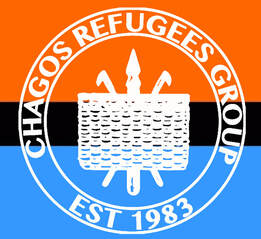 Please read and share Olivier Bancoult's new article demanding the US and UK governments provide justice for the crimes against humanity committed against Chagossians! https://www.opendemocracy.net/en/chagos-islands-olivier-bancoult-uk-us-military-base-human-rights-watch/ The British government has announced a dramatic policy change: it will begin negotiations with the government of Mauritius about Chagossians returning home and sovereignty over Diego Garcia and the Chagos islands.
Chagossians must be an equal partner in these negotiations. Period. Human Rights Watch just published a major report showing that the US + UK governments committed CRIMES AGAINST HUMANITY by forcibly displacing the Chagossian people during construction of the US military base on Diego Garcia + barring Chagossians from returning home for more than 1/2 a century.
The report, “That’s When the Nightmare Started," is an unprecedented condemnation of the US + UK by a major human rights organization. Human Rights Watch calls for full reparations for the Chagossians from the US + UK, including: 1) allowing #Chagossians to return home 2) resettlement assistance 3) proper compensation for 1/2 century of exile 4) official US + UK government apologies 5) public release of documents related to the Chagossians. Read the report: https://www.hrw.org/report/2023/02/15/thats-when-nightmare-started/uk-and-us-forced-displacement-chagossians-and Watch a 1-minute video: https://www.youtube.com/shorts/a0Ah3k88yOc Watch a powerful 18-minute video: https://www.youtube.com/watch?v=YkFhy_ET4ik For more coverage and reactions see https://twitter.com/LetUsReturnUSA + https://www.facebook.com/uschagossupport After the British government announced it would start negotiations with the Mauritian government over sovereignty in Chagos and Chagossians returning home, Chagossians rightly demanded they be part of these negotiations. Disturbingly the UK government said it would have “conversations” with Chagossians and then excluded them from the first round of talks. Chagossians and supporters including members of Parliament and Human Rights Watch have demanded that Chagossians be fully involved in all future discussions.
Let Us Return USA!, the US support group for the exiled Chagossian people, wants to share some huge updates, including news that Chagossians may be close to going home….
In November the British government announced a dramatic policy change: it would begin negotiations with the government of Mauritius about Chagossians returning home and sovereignty over Diego Garcia and the Chagos islands. Chagossians rightly demanded they be part of these negotiations. Disturbingly the UK government said it would have “conversations” with Chagossians and then excluded them from the first round of talks. Chagossians and supporters, including members of Parliament and Human Rights Watch, have insisted that Chagossians be fully involved in all future talks. Human Rights Watch’s involvement (see video) is another major development, increasing pressure on the US and UK governments and support for Chagossians. HRW, one of the world’s leading human rights organizations, will release a major report about the Chagossians in the next few weeks. HRW has already demanded that any UK-Mauritius agreement include a commitment to the right of return and full reparations. The links underlined above provide more information about the new developments. For other major updates click the link below.... "Paradise Lost: How Building of US Base on Chagos Led to Heinous Crimes": https://www.hrw.org/video-photos/audio/2023/02/15/paradise-lost-how-building-us-base-chagos-led-heinous-crimes
Perhaps the biggest-ever article in the US press was just published in the major news magazine "The Atlantic," signalling growing momentum for the Chagossians finally winning the right to return home and justice. https://www.theatlantic.com/magazine/archive/2022/07/reclaiming-chagos-islands-british-colonization/638444/
Everyone should read and SHARE this powerful article about the US + UK governments' brutal exile of the Chagossian people. AND, sadly, the article overlooks one major detail: The leading role US officials played in orchestrating + PAYING for a crime in which UK officials were effectively hired thugs. This means the article's subtitle is inaccurate + should read: "Half a century ago, the U.S. AND British governmentS forcibly removed 2,000 people...." While both the UK + US governments bear responsibility for the crime, the US government was always the senior partner. Here's why... US officials: 1) Dreamed up the idea for a base on Diego Garcia in the late 1950s + 1960s; 2) Insisted on the removal of the Chagossians during secret 1964 negotiations in London; 3) Proposed the UK violate UN decolonization rules by creating a new colony (British Indian Ocean Territory) to secure base rights; 4) Secretly paid the UK government $14 million for deportating the Chagossians + basing rights via a secret 1966 agreement; 5) Ordered the final removal of Chagossians from Diego Garcia in 1971, with the highest ranking official in the US Navy's words, "Absolutely must go"; 6) Assisted with the killing of Chagossians' pet dogs (the exhaust noted in the article came from a US Navy jeep); 7) Covered up the crime by lying to Congress, the media, + the world about the Chagos islands being "uninhabited"; 8) Barred Chagossians from working on the Diego Garcia base; and 9) Supported UK government efforts to prevent Chagossians from returning to their homeland. Cullen Murphy is to be complemented for writing an article about a crime the US media has long ignored. Please share it widely but tell @TheAtlantic + others: Don't get it twisted, the mastermind behind the crime of exiling the Chagossians was + is the US government. I provide details + evidence for all of the above in my book, "Island of Shame: The Secret History of the U.S. Military Base on Diego Garcia," which Murphy nicely mentions in the article. -David Vine 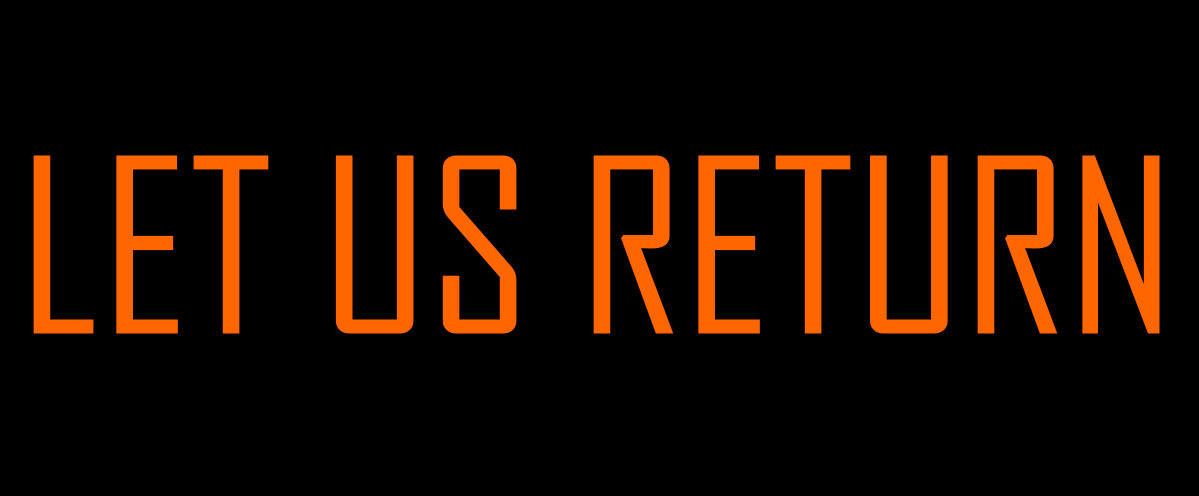 A major New York Times op-ed shows how the US and UK are holding onto Diego Garcia as a colony and preventing Chagossians from going home. Both governments claim to be committed to international law and criticize the Chinese government for violating international law but then hypocritically and illegally hold on to Diego Garcia. This double standard is "brazen," "grotesque and damaging." The author, Philippe Sands, calls for the UK to return the Chagos islands to their internationally recognized sovereign, Mauritius, and for its government to follow through on its promises to allow Chagossians to return, while also giving the US a 99-year lease to the Diego Garcia base. Sands says this can be "a win-win-win proposition," in which "security, human rights and the marine environment are protected." We hope the Biden administration respects international law and the international community by pushing the UK to give up its last-created colony. https://www.nytimes.com/2021/04/01/opinion/uk-mauritius-china-us.html Diego Garcia is one of the United States’ largest overseas military bases. It was built with the expulsion of the Chagossians, who had lived there for generations, and the occupation of their archipelago. International law and courts have repeatedly ruled the occupation as illegal but the US (and UK) continue to occupy the territory and dismiss the concerns of the Chagossians. @joebiden will you continue to stay silent or will you bring justice to the Chagossians? Let us return!
Major news! The UN has again ruled it is finally time the UK upheld its end of international law and end its "unlawful" occupation of the Chagos Islands. The UN International Tribunal for the Law of the Sea ruled last week 8-1 that Mauritius, not the UK, has sovereignty over the Chagossians' homeland.
This is a massive victory for the Chagossians as the Mauritian government has promised to allow Chagossians to return home. The UK seems set to ignore the ruling. The major question is whether the new Biden/Harris administration will support the UK's unlawful occupation or support the Chagossians and international law.... (Also: the ruling came just days before the UK’s accent to the presidency of the UN Security Council with the self-proclaimed focus of “human rights.") https://www.theguardian.com/world/2021/jan/28/un-court-rejects-uk-claim-to-chagos-islands-in-favour-of-mauritius The UK and US governments suffered what The Guardian called a "crushing" defeat and a "spectacular" diplomatic failure when the UN General Assembly voted 116-6 in support of the International Court of Justice ruling that Mauritius, not Britain, is the lawful sovereign in the Chagos islands and that the Chagossians should be allowed to go home. The General Assembly vote gave the UK 6 months to return sovereignty to Mauritius. There is lots of media coverage. Here's the New York Times: https://www.nytimes.com/2019/05/22/world/africa/britain-chagos-mauritius.html
|
Let Us Return USA!
Archives
January 2024
Categories |
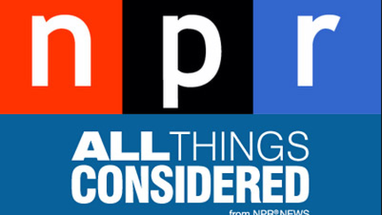
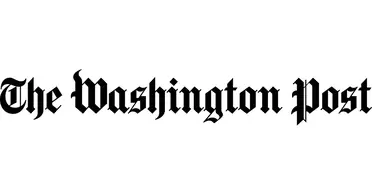
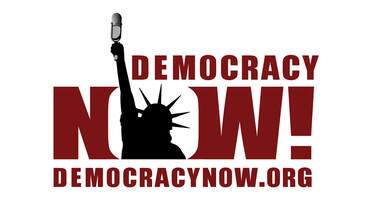
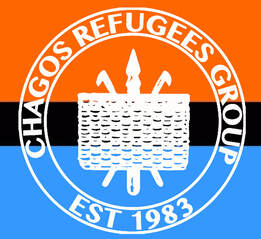
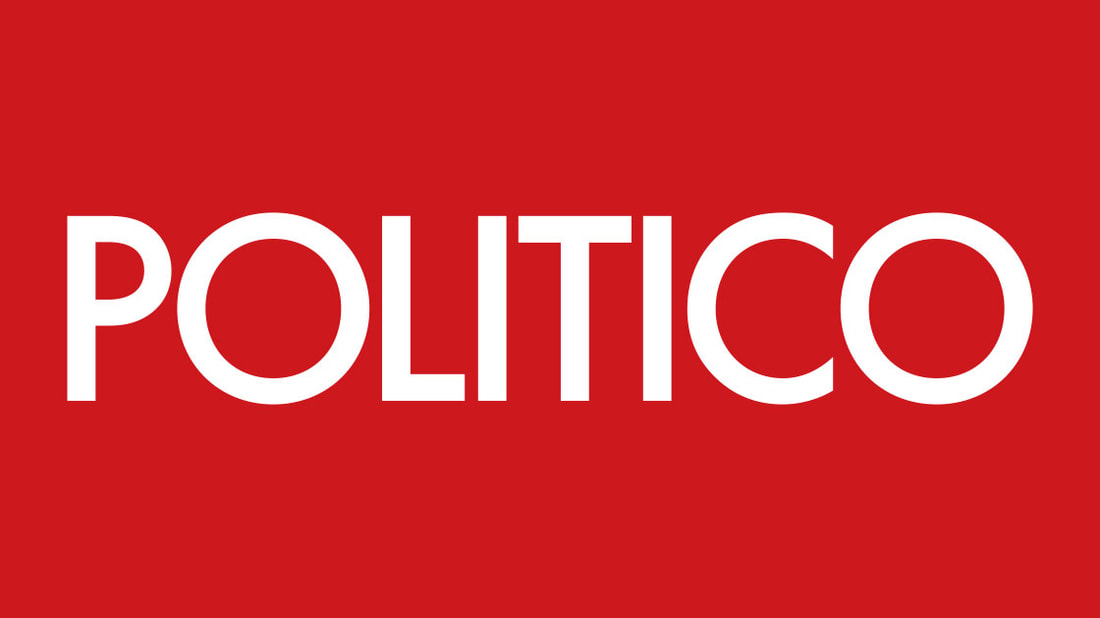
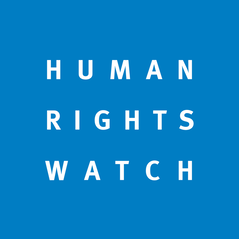
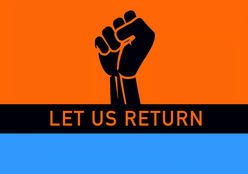
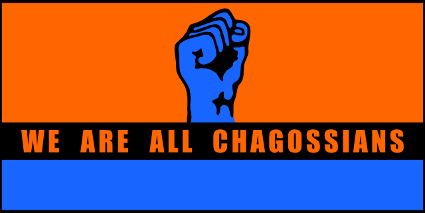
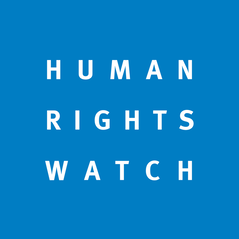
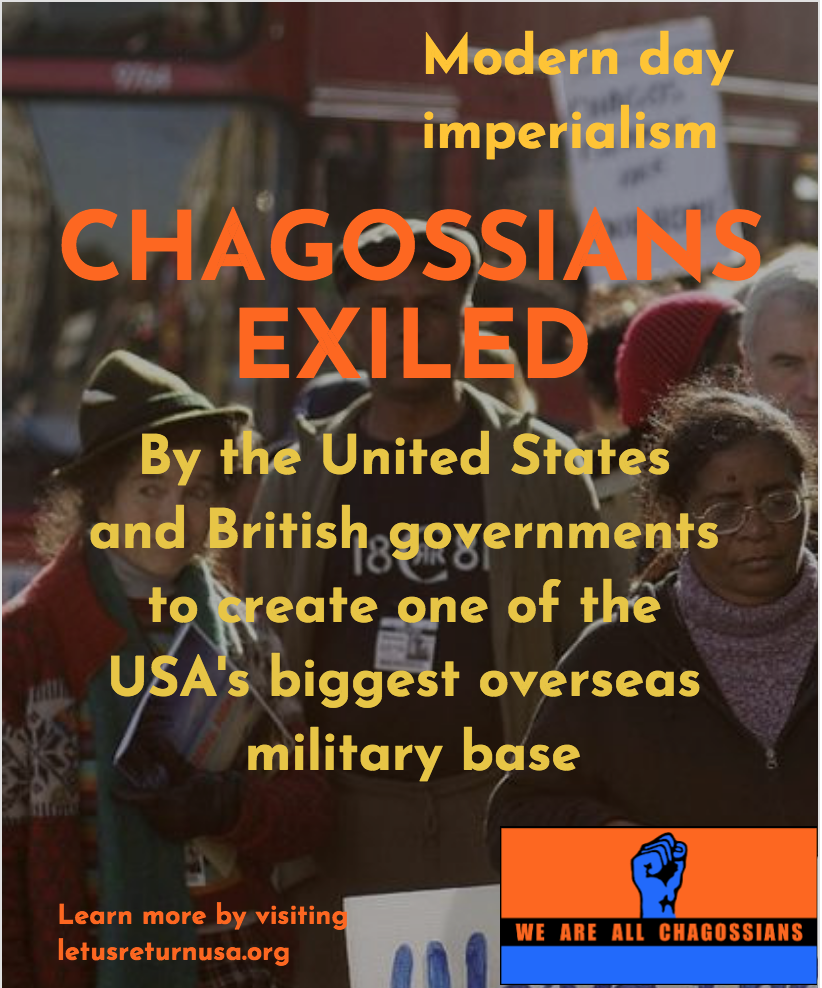
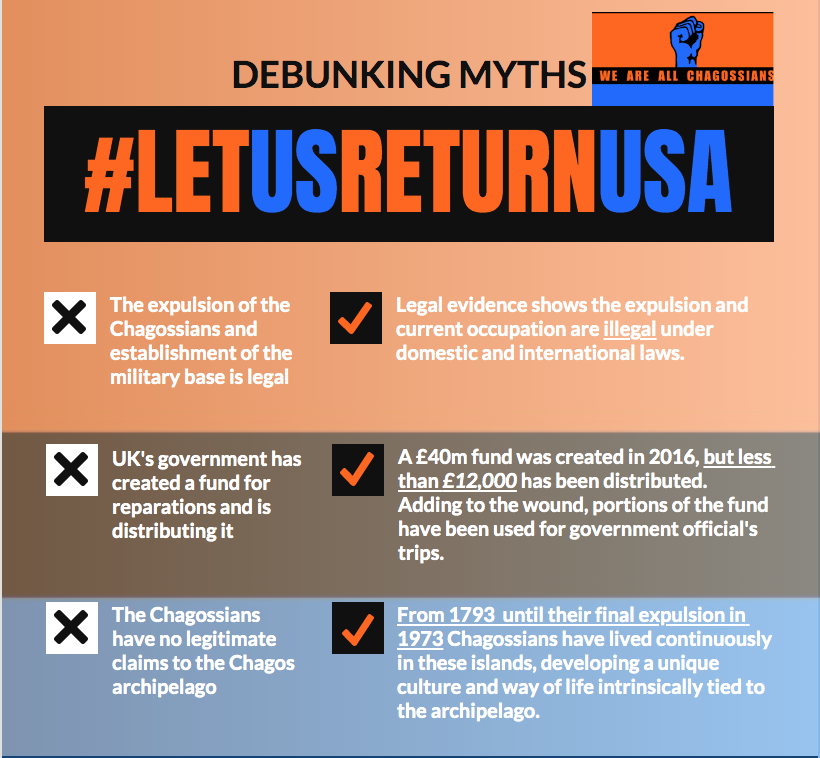
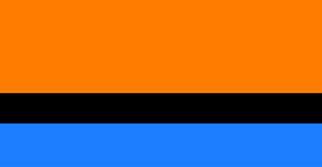
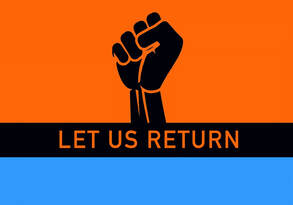
 RSS Feed
RSS Feed